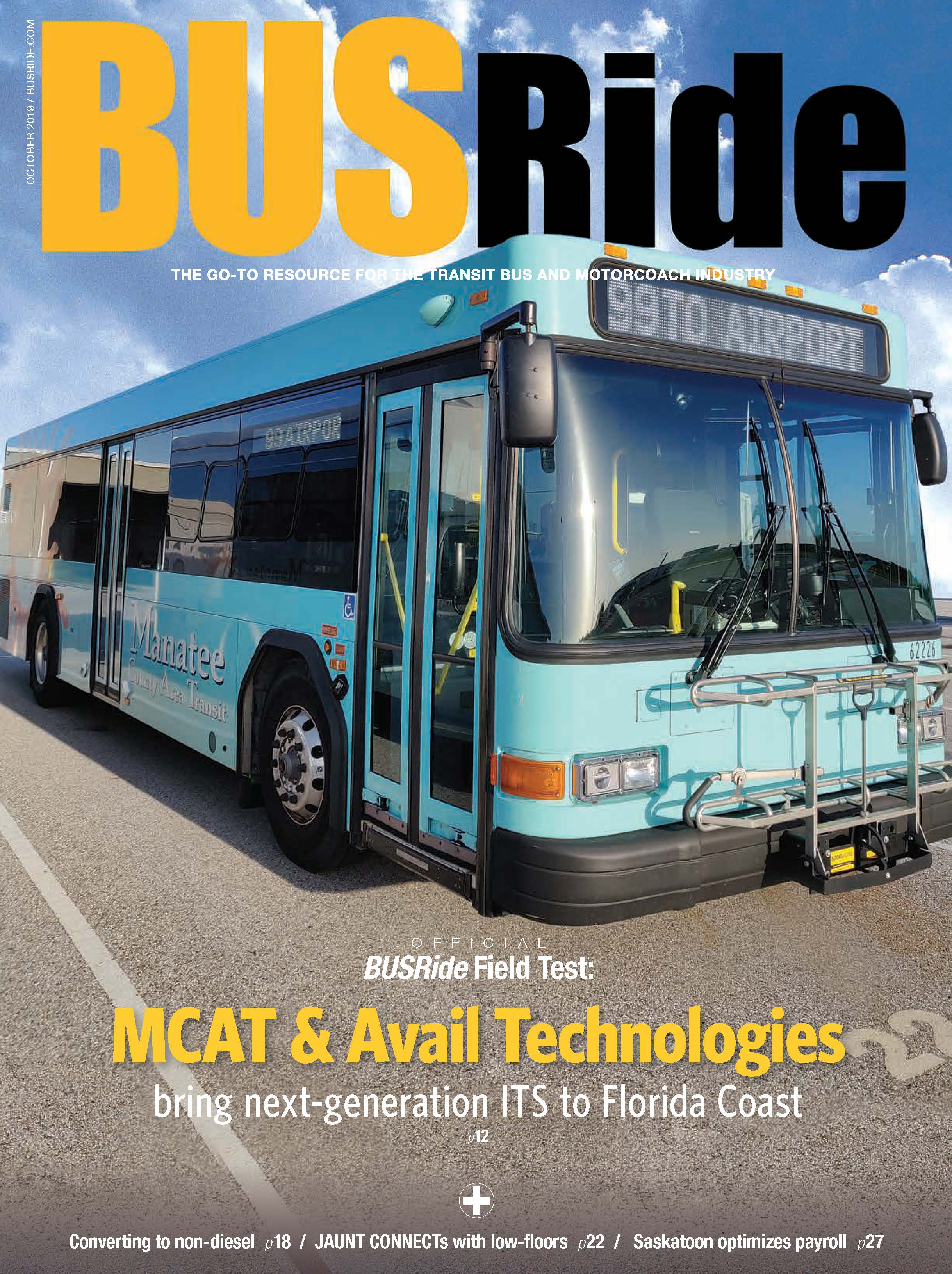
BUSRide Field Test – MCAT & Avail Technologies Bring Next-Generation ITS to Florida Coast
Partnering with Avail Technologies, Manatee County aims to compete technologically with the nation’s largest urban agencies.
The team at Manatee County Area Transit (MCAT), serving a total ridership of more than 2 million along Florida’s West Coast, prides itself on providing its passengers the same high-level of technology and transit access which is afforded to urban riders in places like Boston and New York City.
To that end, MCAT began working with Avail Technologies, a fullscale Intelligent Transportation System (ITS) solutions provider, in May 2018, to dramatically upgrade the agency’s fleet tracking, passenger information, data processing and analytical tools.
“This kind of a system is a first for our agency, on fixed-route vehicles,” said Trieu Nguyen, business services manager for Manatee County’s transit division. “The agency did not previously have any real-time reporting or CAD/AVL capabilities, so this was new for our staff and for our ridership.”
Making contact
Initially, MCAT tried a pilot program on five of its vehicles with another CAD/AVL provider. After around nine months, it was clear to MCAT’s team that the program was not working.
“We learned what we could expect in terms of workload, with this kind of system,” said Ryan Suarez, planning manager at MCAT. “We also learned about the equipment and, of course, vendors and their ability to respond to our needs.”
Returning to square one, the MCAT team tried a different approach. Rather than hire a consultant to write a technical spec for a system, setting out every last detail for a potential vendor to fulfill, the team opted for an outcome-based procurement.
“We asked, ‘If we, as an agency, spell out every detail, what are we really asking these vendors to do?’” Suarez said. “If we wanted innovation, we needed to outline the outcomes we wanted to see and let the vendors tell us how they would accomplish those outcomes.”
The procurement process for this project was so novel that the agency won the “Innovation and Creativity Award” from the Florida Public Transportation Association in 2018.
MCAT’s outcome-based procurement eventually selected its provider– Avail Technologies. Of the five proposals received, Avail’s was closest to MCAT’s specifications in terms of system features and integrational capabilities.
A unified platform
Avail’s myAvail system goes beyond CAD/AVL, providing role-based user interfaces for bus operators, as well as dispatch, finance, and administration staff. Its capabilities include automatic mining and analysis of operational data, configurable performance metrics dashboards, pre-emptive notification of upcoming issues, as well as onboard, desktop, email and text alerts to avoid operational issues.
“These capabilities are a big part of MCAT positioning itself as the progressive county to bring technological innovation to the region,” said Rick Spangler, chief technology officer at Avail.
Avail and MCAT are bringing the ITS deployment a step further with a real-time passenger information system. Suarez expressed that, after a recent onboard survey, MCAT officials found that the top desire among its riders was knowing exactly when the “next bus” is coming.
The Avail system is designed to answer that question with real-time predictive arrival information, available to riders via Avail’s myStop app. Using the app or online interface, passengers will know how long they need to wait at any stop throughout the system. Furthermore, MCAT is available to provide next-stop information to passengers onboard a bus via Avail and its passenger-information technology partner Message Point Media.
“Knowing the exact location of our buses affords the agency a lot of other operations opportunities,” Suarez said. “That direct control allows us better headway management, customer service, and internal efficiencies, and also provides faster response times when incidents arise.”
System deployment and training
Outfitting its fleet with Avail’s suite of technology proved more difficult than originally expected, due to the variety of vehicle models in the MCAT fleet.
“It took a while, but we absolutely hired the right vendor when it comes to installation,” Nguyen said. “Avail really showed their experience, sending their best field engineer down to help us with every step of the installation. He quickly diagnosed any issues we had on a given bus and got right to fixing it.”
When inspecting Manatee, it was clear to Avail’s team that the agency had investments in other technologies (like head-signs and fare collection) from which it was looking to get better and more accurate data.
“Knowing all of MCAT’s integration requirements, we provided elements like a single point of login; automating the destination signs so drivers can be hands-free; and providing a greater level of information from the farebox, allowing for better data analytics,” said Ken Bachman, project manager at Avail. “We know they invested in these products, so our system interfaces with those technologies and provides a much more streamlined, paperless operation.”
Avail typically “trains the trainer,” but MCAT officials said that the company went above and beyond and trained its operators and other agency staff directly in groups.
“We handled MCAT’s training in one-on-one sessions with dispatchers, road supervisors, planners and other groups, delivering what we call our B.I.B. – a ‘Bus In a Box,’” said Steven Economos, systems engineer with Avail. “That box includes all the components an operator would need to recognize and know how to use, packed in a nice package that sits quite well on top of a desk.”
“They have been very flexible, and they have adapted to us, as much as we pushed them,” Suarez added. “We don’t get the same level of customer service from other vendors and integrators, even for menial issues. That has been very important to us, and it validates our selection of Avail as our vendor.”
In addition to the initial training, Avail has a dedicated FAST™ Team (Follow-on Adoption Services and Training) which takes over after the project technically closes. The FAST™ Team provides follow-up training efforts, regularly asking MCAT about areas where the agency still has questions about usability and system capabilities.
Pushing MCAT forward
Suarez said that the demand for this type of information was clearly present from MCAT passengers and that the system’s capabilities will drive ridership to the agency.
“Even though the bus might be running later than a new customer might think, at least they know where the bus is.,” he said. “That gives users a measure of confidence that overcomes some of transit’s barriers to entry.”
“Avail has a motto: ‘Customers for life,’ Spangler added. “The industry trend continues to be that after five or six years; agencies are looking to replace these systems. But Avail has customers that have been using our technology going on 19 years now – and Manatee has a vision to buy into that concept. Their agency knows that it’s not just about the tools a vendor provides – it’s about the services and outcomes they help you provide your ridership.”
